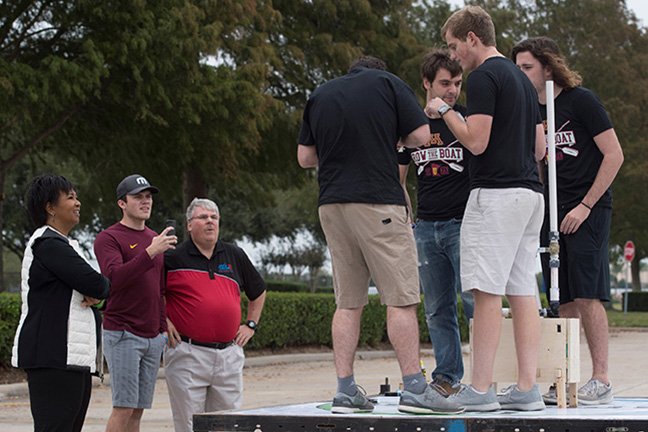University of Minnesota students win Bayer-Big Ten Alka-Rocket Challenge

Rocketeers earn $25,000 and GUINNESS WORLD RECORDS title
MINNEAPOLIS / ST. PAUL (11/09/2017)— A triumphant team of student rocketeers from the University of Minnesota has blasted its way into history by winning the Bayer-Big Ten Alka-Rocket Challenge and capturing a place in the annals of GUINNESS WORLD RECORDS.
Created by Bayer, the Challenge is an out-of-this-world competition to design and launch an Alka-Rocket that sets the GUINNESS WORLD RECORDS title for the highest launch of an Alka-Rocket.* A panel of judges named the University of Minnesota team as winner of the Challenge after the team’s Alka-Rocket soared 430 feet in the air during finals held at Space Center Houston in Texas.
The University of Minnesota prevailed over teams of finalists from Northwestern University and Rutgers University. About 100 Houston-area school children were also on hand to witness history in the making.
In addition to a GUINNESS WORLD RECORDS title, the winners take home a cash prize of $25,000. On Dec. 2, the rocketeers will be recognized on the field of Lucas Oil Stadium in Indianapolis during the Big Ten Championship Game.
A staple of backyard science experiments, Alka-Rockets are model rockets often built using a 35mm canister propelled by the chemical reaction that occurs when effervescent tablets are mixed with water. The University of Minnesota rocket was made of fiberglass and 3D-printed parts. It was extremely light and weighed only about 50 grams or two ounces. The team used all 100 Alka-Seltzer tablets allowed in the competition.
“This competition gives us a chance to show off our engineering skills on the national stage,” said Kevin Schrader, an aerospace engineering student who served as leader of the Alka-Rocket team. “This gave us a chance to get into a good competition, compete against other schools in the Big Ten, and represent our school.” Schrader is also a recipient of the Frank Louk Scholarship and Wesley and Sonja Swanson Scholarship.
"Before this competition, I had no idea that Alka-Seltzer and water could build up so much pressure," said Machlen Polfliet, a freshman planning to major in aerospace engineering and the recipient of the Cyrus and Mary Field Scholarship and the Roland Weise Scholarship.
In addition to Schrader and Polfliet, students representing the University of Minnesota Rocket Team in Houston were Jeffrey Guevara, a mechanical engineering student; Brody Hultman, a freshman planning to major in mechanical engineering; and Andrew Van Gerpen, a freshman planning to major in aerospace engineering.
But, the students weren't the only ones who enjoyed the competition, the judges did, too.
“The Challenge has been a blast to be a part of,” said Dr. Mae Jemison, former astronaut, engineer and science education leader. “My fellow judges and I were very impressed with the modeling, testing and ingenuity the college finalists teams demonstrated in the design and launching of their Alka-Rockets. We will certainly be looking to them to build the next advances in science and engineering in the years to come.”
In addition to Jemison, judges of the Challenge were Cliff Ransom, executive editor of Scientific American Custom Media, and Dave Brown, coordinator of Space Center Houston’s Space Center University.
Bayer created the Challenge and partnered with the Big Ten to generate awareness about the country’s need for more scientists, engineers and innovators. Bayer has a longstanding commitment to science literacy and STEM (Science, Technology, Engineering and Mathematics) education. In addition to dominating all athletic conferences, Big Ten universities lead the nation in completion of PhDs in Mathematics, Engineering and Science.
“Bayer’s partnership with the Big Ten has enabled us to make the Alka-Rocket Challenge exactly what we envisioned – an opportunity to have a blast while conveying the importance of science literacy and STEM education,” said Raymond F. Kerins Jr., Senior Vice President of Corporate Affairs for Bayer. “We congratulate the University of Minnesota and look forward to recognizing their accomplishment at the Big Ten Championship Game next month.”
Alka-Rockets are often used in American science classes to demonstrate principles of chemistry and physics. For more than a quarter century, Alka-Rockets have been a staple experiment in Bayer’s Making Science Make Sense® (MSMS) award-winning science literacy initiative in the United States.
*The official title recognized and recorded by GUINNESS WORLD RECORDS is "Highest launch of an effervescent tablet."
If you'd like to support University of Minnesota College of Science and Engineering students, visit our CSE Giving website.
